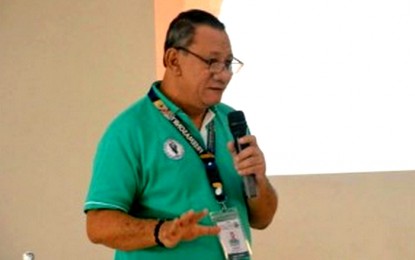
NO ENTRY. Dr. Antonio Ephrem Marin, head of the General Santos City Veterinary Office, said on Saturday (April 17, 2021) the city government has temporarily banned the entry of all live hogs from other regions, especially in Mindanao, due to the continuing threats posed by the spread of the African swine fever. The order was enforced in the wake of the continuing attempts by some traders to bring in hogs from other areas. (File photo courtesy of the city government)
GENERAL SANTOS CITY – The city government has temporarily banned the entry of all live hogs from other regions, especially in Mindanao, due to the continuing threats posed by the spread of African swine fever (ASF).
Dr. Antonio Ephrem Marin, head of the City Veterinary Office, said on Saturday the ban was directed by City Mayor Ronnel Rivera effective Friday through Executive Order 15, which further strengthened the city’s precautionary measures against the disease.
Marin said it specifically expanded the prohibition on the entry of live hogs and pork products, which previously included ASF-hit areas in Luzon and the Davao region.
Under EO 15, he said all live hogs coming from outside Region 12 (Soccsksargen) would not be allowed entry in the area while the ASF outbreak persists.
Marin said his office, in coordination with hog producers, requested such a move in the wake of the continuing attempts by some traders to bring in hogs from other areas in Mindanao.
He said they monitored hog shipments from Bukidnon, which is still considered free from ASF but practically “boxed in” by “red” or infected zones.
He added that some local farms have been sourcing grower hogs from several breeders based in Bukidnon.
Their monitoring and enforcement teams have already intercepted this week at the city entry checkpoints three trucks that were loaded with 51 hogs.
“The shipments have veterinary and transport permits but we still did not allow them to enter the city as they failed to present laboratory test results showing that the animals are ASF-free,” he said in an interview.
Marin said they are worried about the adoption of the “tooth extraction” approach by some hog raisers in the other regions that were affected by the ASF outbreak.
The practice, which is widely adopted in China, focuses on “spot elimination” or removing only the affected animals instead of depopulating.
“We need to implement stricter measures to protect our hog industry from these threats,” he said.
Cases of ASF were detected in Sarangani province last year and parts of North Cotabato but these have been contained as reported by the Department of Agriculture.
Hog producers in this city and nearby South Cotabato province ship some 25,000 to 30,000 heads of live animals and frozen carcass every month to Metro Manila and other key markets in the country.
The area’s commercial hog inventory is pegged at about 490,000 heads while those in backyard farms are estimated at 37,000 heads, making it among the top producers in the country. (PNA)
